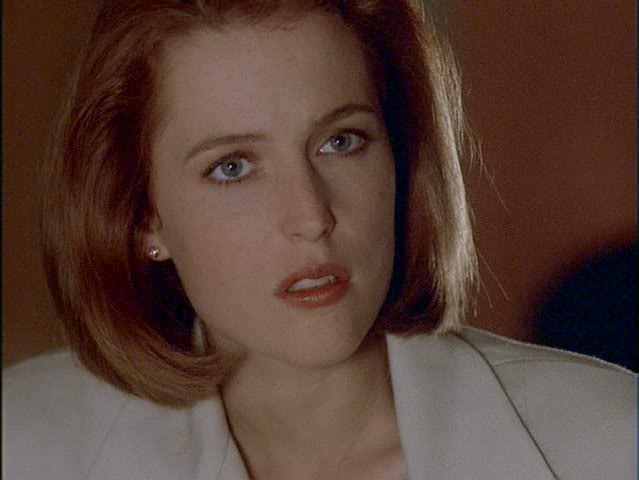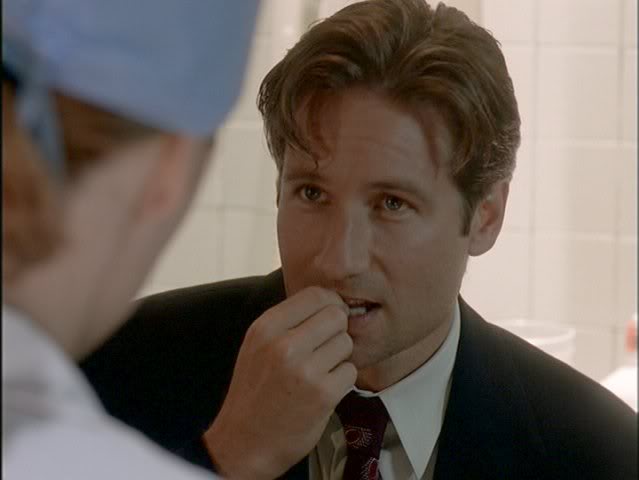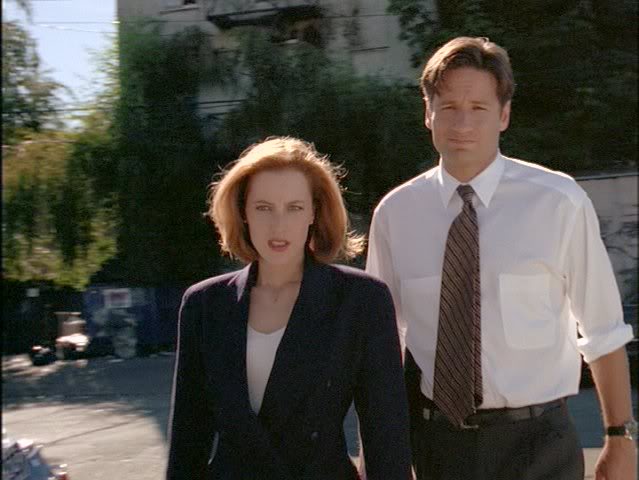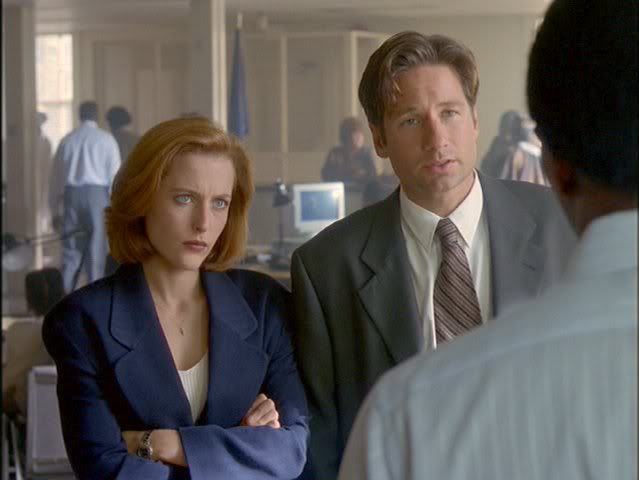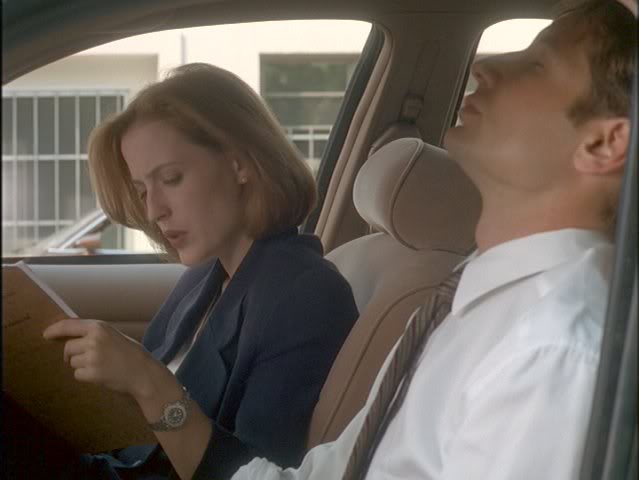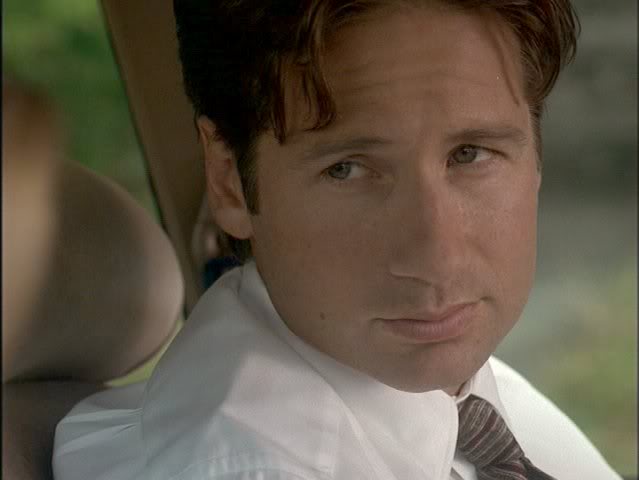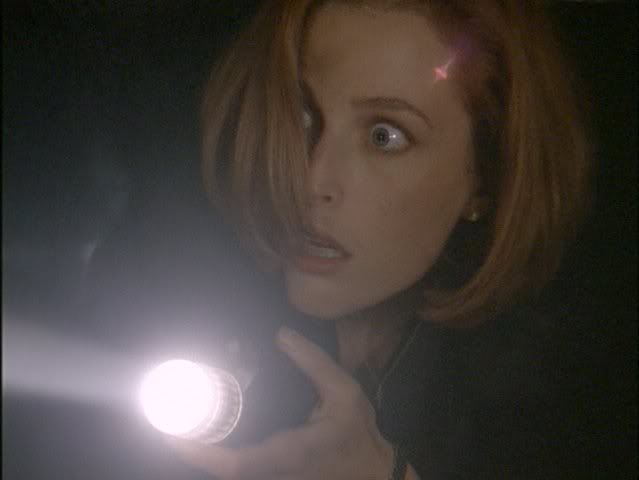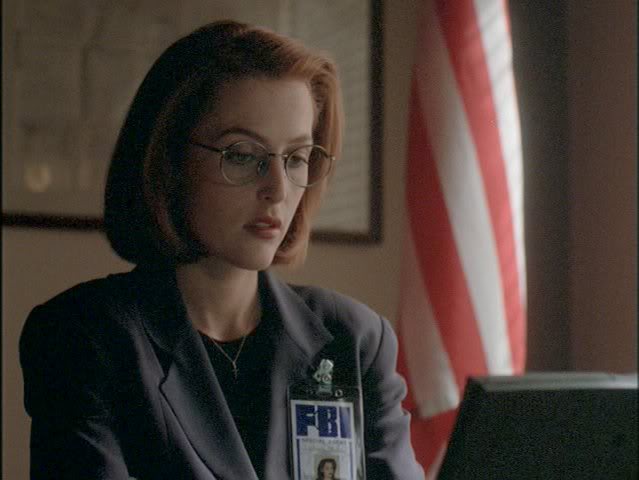REPOST - CTP Episode of the Day - 04.13.06 – Teliko
Today's Cherished Episode: Teliko (6x04)
Original Air Date: October 18, 1996
Written By: Howard Gordon
Directed By: James CharlestonAfrican-American men are disappearing. Their bodies, when found, are dead white -- drained of pigment. Were they killed by a virulent new disease? Were they murdered? Or does the answer lie elsewhere?
"You’d be surprised at what I believe, sir."
Some "Teliko" Tidbits and Musings:
-- "Teliko" is Greek for "end."
-- Had the Season 4 episodes been shown in production order, "Teliko" would have been the episode to usher in the series' move to Sunday night. But the powers that be decided "Unruhe" would be better suited for that purpose, so for the first time, episodes were aired out of production order.
-- Timelines placed the episode in late August or early September 1996.
-- The episode was directed by James Charleston who also directed "Avatar," "Synchrony," and "Elegy."
-- The tagline on this episode was changed to a phrase used by Scully and Mulder during the episode, "Deceive, Inveigle, and Obfuscate." This was the first time the tagline was changed for a non-mythology episode. For those without a dictionary, "inveigle" means to win over by guile or persuasion and "obfuscate" means to make dark or obscure, to confuse.
-- "Teliko" marked the debut of the expensive airplane cabin mock-up built specifically for "Tempus Fugit" and "Max," but used in this episode's teaser before its hydraulic special-effects shaking rig was completed.
-- Like many of executive producer Howard Gordon's episodes, "Teliko" had a long and tortured birth process. "Teliko" was born out of sleeplessness and desperation and anxiety, just like "D.P.O." in Season 3 and "Sleepless" in Season 2. "Before I wrote it, I spent about a month working on a story about someone who was immortal," explained Gordon. "With that one I went down the wrong road entirely."
-- After several intense discussions (and emergency cigar-smoking sessions) with consulting producer Ken Horton, Gordon had the notion of dragging two other story elements -- melanin-sucking albino vampires and xenophobia, or fear of foreigners -- off the back burner. Chris Carter happily approved the story line, and Gordon wrote a first draft of the script -- which everybody hated.
-- "It was way off the mark," said Gordon. "But Chris stayed calm. He convened a meeting and I got significant notes, then we reconvened with Frank [Spotnitz] and the gang and we completely restructured the story and then I basically wrote it all over again in four days."
-- The episode hurtled toward production -- and one final session of self-flagellation. Gordon said, "I'd just come back from pre-production meetings in Vancouver when Chris said, in front of the whole group, 'Why are we telling this story?' And I said, 'Well, Chris, I don't know. But it's shooting, so I'll have to get back to you on that.'"
-- "And once again," Gordon added, "Chris was telling me that the episode needed one more rewrite, one more polish, to give it thematic cohesion. And that's when he came up with the notion of 'deceive, inveigle, and obfuscate.' I went through the whole story that day and night with that template, that tonic chord, in mind. And it came out just fine."
-- It was also Carter's idea, said Gordon, to equip the melanin-sucking Samuel Aboah with a combination blowpipe and pituitary extractor -- and have him carry the lethal instrument in his esophagus.
-- The notion of the Teliko was not entirely fictional -- it was the name of a mythological African "spirit of the air," sometimes thought to be an albino. In fact, in certain African cultures, albinos are shunned and reviled.
-- The Teliko's emergence from the West African country of Burkina Faso was suggested by John Shiban, who remembered it from his days programming foreign air-mail rates into electronic postage meters for a computer software company.
-- For the geographically challenged, Burkina Faso is in western Africa, north of Ghana (it was formerly Upper Volta). It is a little larger than the state of Colorado. It has a population of nearly 12 million, and its capital is Ouagadougou.
-- The casting process was difficult. "We wanted real African guys," said L.A. casting director Rick Millikan, "but in television you don't have a lot of time. We only had a few days, so we called in every real African person we could find. We brought in an African theater troupe passing through town. We called African consulates, the Olympic committee."
-- In the end, the American actor Carl Lumbly, well-known for his role as Detective Mark Petrie on the CBS series Cagney & Lacey, played the Afro-Caribbean INS official Marcus Duff. Winning the role of Aboah was Willie Amakye, a citizen of Ghana who spoke English well but his first language, Fanti, better. (Director James Charleston remembered that Willie Amakye was "a little green, but extremely adaptive and extremely willing.")
-- Amakye was a four-time member of the Ghanian Olympic track team (he ran the 800 meters and the 4X400 relay). He was cast in The X-Files shortly after returning to his home in Southern California from the Atlanta Olympic Games. He had lived in California for more than a dozen years, making his living acting in commercials and movies like Congo and Amistad. Amakye later had a recurring role as Willie on the sitcom According to Jim.
-- Amakye's on-screen transformation from black to white and back again posed a difficult challenge for makeup artist Laverne Basham and her assistant Pearl Louie. "We looked at photographs of albinos and black people with vitiligo," said Basham. "But we weren't really prepared for how black Willie's skin was." The answer, she said, was to prepare a base of several layers of Dermablend cover-up cream, topped by several more layers of standard white powder augmented with a touch or two of pink powder for color. Aboah's pink transparent eyeballs were created with contact lenses.
-- Before Willie Amakye's first day of filming in Vancouver, hair stylist Anji Bernbem and her assistant Dean Scheck dyed Amakye's hair bright orange -- the better to switch it back and forth from black to white. "Back at the hotel, people thought I was the African Dennis Rodman," said Amakye.
-- While composing his music for the episode, Mark Snow called up an electronic smorgasbord of African drums, flutes, and chants -- and admitted sneaking in some samples from "The Bulgarian Women's Chorus," a recording well-known in Southern California as a pledge-drive premium for public radio station KCRW.
-- Amakye said that back in Los Angeles, a young couple he was friendly with watched the episode with their children. When he asked them for their reaction, they told him, "Willie, we love you very much, but stay away from the kids for awhile."
-- 517 reference: In the scene after the opening credits, Scully arrived at work at 5:17 a.m. (5:17 a.m.??) 5/17 is the birthdate of producer/writer Frank Spotnitz's wife.
-- Oopsie? When Marcus Duff visited Aboah at his apartment, Duff stated he was there to assist Aboah with his naturalization petition. However, to become naturalized as a United States citizen, a petitioner must have resided in the United States continuously for at least five years. It was implied that Aboah arrived in Philadelphia only three months prior to Duff's visit.
-- In his telephone chat with Scully, just before jetting off to New York, Mulder actually said "bye-bye" at the end of the conversation.
-- When Mulder glanced at Aboah's resident alien card, it showed that Aboah's birthday was 9/25/62. Gillian Anderson's daughter Piper was born on 9/25.
-- Mulder once again defied all laws of time and space: He was at the hospital in Philadelphia at 5:45 p.m. but managed to be at the Burkina Faso Embassy in Washington, D.C., at 6:45 p.m. Traffic must have been really light on I-95!
-- Mulder dropped his gun *and* his flashlight in this episode.
-- As Scully typed her report at the end of the episode, she seemed to be in an office that featured a flag and a window. If that was her office, why did she want a desk in the basement? (I think you know!)
-- Five years after this episode aired, Carl Lumbly would play another character with the first name Marcus and a last name starting with D. In "Teliko" his character was Marcus Duff; in Alias his character was named Marcus Dixon.
-- Once & Future Retreads: Brendan Beiser made his sixth appearance as Agent Pendrell. Laurie Holden made her second appearance as Marita Covarrubias. Bob Morrisey (Dr. Simon Bruin) was Dr. Vinet in "Emily." Oscar Goncalves (Orderly) was a Night Attendant in "Zero Sum."
(Thanks to chrisnu for today's pics.)
Please share your first impressions, favorite (or cringe-worthy) moments, classic lines, favorite fanfic, nagging questions, repeated viewing observations, etc., as today we celebrate "Teliko."
Polly
